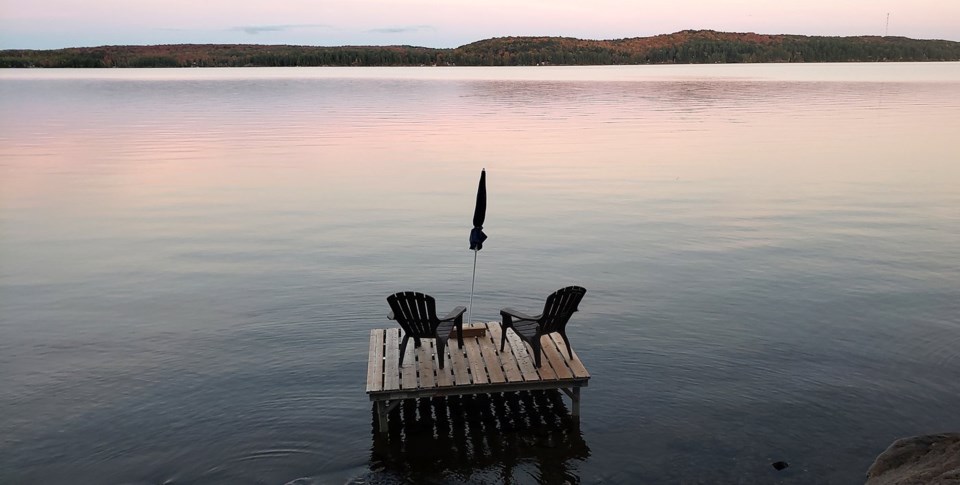A lakeview cottage with cosy rooms, a sandy beach nearby and a dock to gaze into the sunset was the dream for Corrine Evanoff.
"For years, I've been on this journey of trying to find a cottage that would work for us," she said.
But Evanoff and her husband didn't want to incur the burden of constant cottage maintenance — spending vacation days fixing decks and pruning trees. They opted instead to rent over the years, still hoping to one day buy.
Then, it happened. They found a cottage not too far from home — for a fraction of the price they thought they'd have to pay, thanks to fractional ownership.
Also called co-ownership, it allows people to buy a share of a property with others, whether it's family, friends or even strangers.
Affordability sits at the heart of fractionally owned cottages. Many Canadians still find themselves priced out of the market, even as cottage prices have declined from peaks seen during the pandemic.
Re/Max brokers and agents anticipate a national average price increase of about 1.8 per cent across the Canadian recreational market in 2025, a May report by the real estate firm, showed.
On their first visit to check out a prospective cottage last fall, Evanoff recalled walking into a lake-facing cottage with large windows at Frontenac Shores in Cloyne, Ont., about 300 kilometres northeast of Toronto, and was sold.
"We sat in these Muskoka chairs on the beach and our feet are in the water, and I just felt the stress shredding off me," she said.
"This is the dream that I've been dreaming for all these years … and this is within reach."
Evanoff and her husband now own one-tenth of a million-dollar cottage, costing them less than $100,000 for their share — and affording them five weeks a year at the property.
Fractional ownership of a cottage is not like a timeshare, said Realtor Mike Lange, who has been dealing with co-owned cottages for about seven years in Kawartha Lakes, Ont.
"With a timeshare, you put your name in requesting a location, you have no guarantee that that's going to be available," he said. "There's been a lot of heartaches over them over the years."
Timeshare properties can be owned by for-profit corporations, leaving less autonomy for those staying there.
Don Smith, who co-owns a property in Kawartha Lakes, bought into a cottage in the mid-2000s after he saw a newspaper ad about fractional cottage ownership.
"I was in the staff room reading the newspaper as a mathematics and computer studies teacher," he recalled. "As a math teacher, that caught my eye: What's this fraction all about, this cottage, this idea?"
For the Smiths, fractional ownership wasn't a financial investment but a lifestyle investment that has paid off over the past two decades.
"This is where my daughter learned to swim, that's where my daughter learned to kayak, that is when my daughter had learned to appreciate animals."
But it may not be for everyone.
Smith said fractionally owned cottages are usually 100 per cent debt-free. That means new co-owners typically can't secure a mortgage against the property from traditional banks and will have to rely on personal loans or a line of credit to buy their share.
Personal touches to the cottage can also be missing with fractional ownership and people can't just show up at any time, he said.
"It's not like you can personally put all your favourite pictures and put all of the junk that you don't want in your home garage and take it up there and leave it," Smith said.
Real estate developer John Puffer has years of experience building cottages and selling them in fractional ownership arrangements in Ontario's cottage country regions.
When he first got into the business, Puffer assumed the buyers would mostly be people in their 30s with young families. Instead, they happened to be people in their 50s and 60s, buying cottage shares for their adult children and grandchildren, or people who don't want to commit the dollars and worry about maintenance.
"That is part of the Canadian cottage experience in Ontario … that's where families congregate at the cottage and (it's) multi-generations," said Puffer, president of Chandler Point Corp.
Tanya Walker, litigation lawyer and managing partner at Walker Law, suggests potential buyers should get a good contract lawyer and treat the contract "as if it's a pre-nuptial agreement" before signing on to be a co-owner.
She said buyers going into fractional ownership should ask questions about who the other co-owners are, the voting rights people get for their share and what happens when they want to sell their stake.
Walker added it's also important to look into who manages the property, the financials of the property as well as how much time you'll get to use the cottage and when.
Puffer said people really have to understand what they're buying into. He suggested people read the contract and find out who's in control, what their obligations are, and talk to people who already own.
For Evanoff and her husband, it will be their third time heading up to the Frontenac Shores cottage next month.
"It's like, wow! That just seems like a gift," she said.
"This (fractional ownership) seems like the best-kept secret but I think it's going to catch on ... and you're going to see a lot of people tap into this market."
This report by The Canadian Press was first published June 15, 2025.
Ritika Dubey, The Canadian Press



